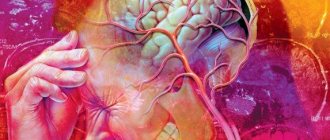Not many people know who an imbecile is. Moronism, imbecility and idiocy are three stages of mental retardation, mental retardation. Mental retardation manifests itself in childhood; the level of intelligence corresponding to a certain age is never achieved. In most cases, this is a consequence of genetic abnormalities; other causes of retardation:
- birth of a child prematurely;
- birth injuries;
- fetal intoxication;
- damage to the nervous system.
The concept of the definition of imbeciles and statistics of occurrence
The word imbecil is of Latin origin: imbecillus - this was the name in ancient times for weak, sick and non-viable babies, who were quickly disposed of.
Imbecility is a mental illness that arises as a result of a violation of ontogenesis (development of the body at the stages of formation). Imbecility is manifested by underdevelopment, first of all, of intellectual functions and clinically corresponds to moderate and severe mental retardation (according to the International Classification of Diseases, 10th revision).
It should also be noted that not only mental factors are highlighted, but also the appearance of the person himself, his characteristic appearance, and body composition. Delayed physical development, defects of organs and body parts (head, limbs, internal organs) are possible. Thus, from very early childhood, various disorders and developmental features appear. An imbecile, as a rule, has a limited vocabulary, represented by simple individual words. Concrete thinking, no imagination or figurative representation. Imbeciles do not have a wide range of knowledge, but can learn basic reading and arithmetic skills with good teaching.
The diagnosis of oligophrenia is made on the basis of IQ. An IQ score of 31 – 49 corresponds to moderate mental retardation, and 20 – 34 – severe. Mental age stops at 6–9 years for moderate cases, and 3–6 years for severe cases.
The actual number of patients is difficult to calculate within a single region of the country. This depends not only on the detection of the disease and diagnostic criteria, but also on the characteristics of culture, society, and the current education and upbringing system. Thus, the prevalence of mental retardation ranges from 1 to 3% of the total population.
Imbecile - who is it?
To be sure how to write correctly: imBicil or imbecil, you need to know the Latin word from which the name comes. Imbecillus – “weak, weak” .
Imbecile is an average degree of oligophrenia (dementia), caused by underdevelopment of the fetus or the acquisition of a defect in the first 3 years of life. According to the IQ test, imbecility corresponds to indicators of 20-50 points.
In this case, not only the sphere of thinking, memory, attention suffers, but also the emotional-volitional one. The disease also affects speech and physical fitness, the ability to independently care for yourself in everyday life and acquire new skills.
Today the name has gone beyond professional use in psychiatry. In everyday language it has acquired a negative connotation .
Therefore, the term "imbecile" was replaced, and it is now more appropriate to use the term " moderate mental retardation " to define the diagnosis.
Mechanism of development of imbecility
So, imbecility occurs due to a violation of ontogenesis. What lies behind these words? Who is an imbecile really?
Ontogenesis is the process of development of an organism with its own stages and phasing, the gradual complication of the previous structure. This applies not only to the physical component, but also to mental functions. Those. A person, before growing up and becoming an individual, goes through early, preschool, school and puberty periods (up to 18 years). Before this age, the formation of basic skills and abilities occurs. Mental development has a huge connection with heredity, genetics, constitution, and not just with the influence of environmental conditions (family, upbringing, education, society). Thus, for each person, the formation of the nervous system occurs at an individual pace.
Dysontogenesis is a breakdown, problem, difficulty at one of the stages of development, both physical and mental. Mental underdevelopment includes variants of mental retardation. This mechanism is based on brain damage and disruption of brain activity at the earliest stages of development. More rare variants of the problem are dysfunctions of peripheral analyzers, such as vision and hearing, or fundamentally incorrect parenting.
Mental retardation is an example of total underdevelopment of the mental sphere with a pronounced defect in the intellectual component. This is a fairly broad, capacious and correct, from a medical point of view, concept.
Reasons for the formation of imbecility
The reasons that can provoke imbecility can be divided into several categories.
Intrauterine (prenatal):
- infectious diseases of the mother (rubella, measles);
- intoxication;
- unbalanced and insufficient nutrition;
- endocrine disorders;
- radioactive exposure;
- incompatibility of Rh blood groups between mother and fetus.
During childbirth (perinatal):
- mechanical damage to the brain;
- oxygen starvation;
- bleeding in the brain (cephalohematoma).
After childbirth (postnatal):
- infectious diseases of the child (meningitis, encephalitis);
- brain injuries.
Mental retardation does not always develop in the presence of these factors. No less important is the time (period) when the negative impact occurred. And also, what kind of immunity and general condition did the pregnant woman and child have?
Scientists tend to believe that heredity does not have much influence on the appearance of signs of imbecility. For example, Down's disease is not transmitted to offspring, since its occurrence is caused by the nondisjunction of one of a pair of chromosomes during the formation of germ cells in the mother.
parental disorders such as phenylketonuria and Tay-Sachs disease can have an impact They are based on a metabolic disorder that can be inherited by the child.
There is an opinion that microcephaly can also be transmitted, but people with it, as a rule, do not have sexual intercourse.
Main causes of the condition
The etiology of imbecility, like any other variant of intellectual underdevelopment, includes a complex of factors. These are not only hereditary, but also external reasons. And there are really a lot of them!
- There are more than 400 harmful agents that can lead to disorders even in the womb. After all, the formation of the nervous system is a very delicate and sensitive process.
- Dangers can also occur at birth: hypoxia during childbirth, a long anhydrous period, entanglement of the umbilical cord, multiple pregnancy, infections, toxins, injuries, etc. The most common cause of pathology is maternal alcoholism during pregnancy. An “alcoholic fetus” syndrome is formed, which disrupts the formation of brain cells and subsequently leads to a weak state.
- Heredity and genetic predisposition are also not at the bottom of the list of causes of mental underdevelopment. Chromosomal diseases and gene mutations produce their negative results, being passed on from generation to generation. Moreover, only a small part of them can be identified by cytogenetics.
- The effect of environmental factors: the child’s upbringing and living conditions do not meet the necessary standards, which is a huge obstacle to the development of skills and normal physiological processes.
Diagnostic methods and testing
In order to understand who an imbecile is, you should familiarize yourself with the methods of diagnosing this pathology. According to experts, disorders in the field of brain development can be diagnosed at certain stages of pregnancy. The screening technique allows you to determine the pathology within the first few months. Diagnosis of the level of intellectual development is carried out using various tests and the Wechsler scale. According to established standards, the intellectual development coefficient for this disease varies from twenty to sixty points, taking into account the severity of the disease.
If, as a result of the studies, the patient scores less than fifty-five points, he may be diagnosed with imbecilism. Also, such tests conducted by a neuropsychiatrist help assess intellectual potential. During a diagnostic examination, the doctor conducts a conversation with the patient in order to find out the level of development of the speech apparatus, the breadth of interests and social adaptation. The causes of the disease can be determined using procedures such as magnetic resonance and computed tomography. An electroencephalogram can be used as an additional diagnostic method. In cases of suspected vascular abnormalities, angiography is used.
The photos of imbeciles given in the article allow you to clearly see the anomalies in the development of the human body. It should be noted that imbecility has many similarities with other mental illnesses. The pathology in question has the same clinical manifestations as diseases such as dementia, juvenile schizophrenia and epilepsy.
Stages (severity of pathology)
There are complicated and uncomplicated cases of mental underdevelopment. Also, clinically, imbeciles can be divided into 2 categories regarding the type of temperament: torpid - inhibited, apathetic, indifferent to everything and erectile - easily excitable, irritable, active.
The stages of imbecility are determined according to the level of intellectual development of a person.
- Mild imbecility correlates with an IQ in the range of 35 – 49, which refers to the mental age of 6 – 9 years. Thinking is devoid of abstraction, there is no imagination. Physical developmental defects may be present. A person can master simple self-care skills, perform some simple arithmetic operations, and read.
- The severe stage of imbecility is characterized by an IQ of 20–34, age at the level of a 3–6 year old child. Fine motor skills of the fingers are poorly developed, which makes it impossible to care for oneself. The vocabulary is poor, the words are separate and specific. Such people require constant care and monitoring of their condition.
Stages of imbecility
After the diagnosis of imbecility is made, the patient’s IQ level and the corresponding stage of the disease are determined.
- IQ 35-49, mental age 6-9 years correspond to the mild stage of imbecility. Physical abnormalities are present, but in mild forms, there is no imagination and abstract thinking, the patient can perform simple self-care activities.
- IQ 20-34, mental age 3-6 years - characteristics of the severe stage. Patients are practically unable to care for themselves due to undeveloped fine motor skills; they have the vocabulary of a six-year-old child, but have difficulty putting words into sentences. Physical disorders accompanying imbecility are more pronounced and more severe.
Clinical manifestations of imbecility
Imbeciles have concrete thinking. It is primitive, the vocabulary is sharply limited. Memory, attention, imagination, volitional component are underdeveloped. Higher cognitive activity with imbecility is impossible due to cognitive deficit.
From the first years of life, insufficiency of thinking processes manifests itself in impaired cognitive activity. Fine motor skills of the hands develop poorly, visual and auditory reflexes form later and are distorted. At 2–3 years of age, children with intellectual disabilities are characterized by slow mastery of maintenance skills, lack of cognitive interest in the environment, and primitive play with objects in the form of manipulation. Such children have difficulty finding a common language with their peers and do not understand the rules of games.
In preschool age, children with imbecility are more attracted to active, unfocused games. Emotions are primitive. When entering school life, intellectual problems are increasingly expressed. Attention, memory and concentration are reduced, studying is difficult.
Imbeciles understand the speech of the people around them, but they themselves operate only with a small set of words within a few dozen concepts. The form of speech is simple in the form of short phrases, the grammatical structure is incorrect. In severe cases, speech is absent, and the speech of surrounding people is not perceived.
Persons with a mild form of imbecility can be taught simple self-care skills, simple work activities, basic arithmetic operations and reading.
The learning process must necessarily be accompanied by positive motivation for such individuals, because imbeciles feel a connection with their family and rejoice in their praise. This is a very defenseless contingent of people; they are naive and gullible, passive in making decisions, and prone to imitate and adopt the behavior of others. It is important to create a favorable environment and protect them from antisocial company.
Symptoms and capabilities of people with imbecility
The imbecile's thinking is direct, concrete, without understanding abstract things (what is this?), and flows slowly. Knowledge is limited exclusively to simple everyday issues. Memory, attention, perception are underdeveloped.
Speech is illiterate, and the vocabulary is poor - the names of the most frequently used things in everyday life.
If mechanical memory is more developed, then the child can master ordinal counting and use it only superficially. Can memorize the multiplication table. The concept of number and the meaning of addition and calculation is absent.
Visual and auditory analysis of information is impaired, so it is difficult for an imbecile to distinguish between letters that are written and sound the same. A person may be able to read mechanically, but he does not understand the meaning of words and sentences.
Imbecile children begin to walk late - about 2-3 years. All movements are poorly coordinated, precise motor skills are not formed. You can teach such children to be neat. Special educational programs can help slowly develop existing abilities and capabilities.
People with moderate mental retardation are often aggressive and angry and show inappropriate reactions. Sometimes they are characterized by an antisocial type of behavior. Imbeciles have simple and direct emotions, they show sympathy and they have a desire to help someone in trouble.
People with this disease are characterized by increased suggestibility and a desire to imitate not always the best examples. There is a feeling of self-esteem: a person is embarrassed about the violation of his physical development, his own awkwardness.
In adulthood, imbeciles are able to work if they need to perform simple practical tasks, with an accurate and understandable construction of the algorithm, under the supervision of managers.
to live independently ; periodic or constant supervision from loved ones is required. Despite this, they are completely mobile and agile, can make social contacts, and maintain a simple and understandable conversation.
Orphans diagnosed with moderate mental retardation, if possible, live in special homes for people with mental and thinking disorders in particular.
Some may be sent to study at a special school. In adulthood, they live in psychoneurological boarding schools . In rare cases, they try to provide for themselves by living separately.
Diagnostics
When assessing mental abilities, it is important to rely not only on clinical data, but also on an objective assessment of intelligence level. The Wechsler test is widely used, and the generally accepted measure is intelligence quotient or IQ. In Russia there is a special adapted test for children aged 5–16 years. For younger children, there are various methods for determining the level of neuropsychic development.
At the same time, a clinical determination of the completeness of vocabulary, memory strength, distractibility, the presence of behavioral disorders is carried out, and the level of self-care skills is assessed.
Severity of pathology
Oligophrenia is divided into three forms of severity, each of which is determined by the degree of mental retardation. Imbecilism, which is a moderate degree of mental retardation, also has several divisions. This pathology is divided into moderate and severe forms. Let's look at each of them in more detail.
Moderate imbecility is a condition in which the IQ ranges from thirty-four to forty-eight points. In this condition, there is limited intellectual ability, which is associated with certain situations. People with this form of the disease lack analytical and associative thinking.
The paucity of vocabulary and incorrect construction of sentences forces the patient to use speech skills only in cases of urgent need. The intensity of emotional perception is extremely low. The vast majority of patients experience neurological and psychomotor impairment. Organic lesions of parts of the brain provoke the development of epileptic seizures and symptoms of autism.
With severe imbecilism, IQ scores vary from twenty to thirty-four points. It should be noted that with this form of the disease, neurological symptoms are pronounced. Many patients experience paralysis and significant impairments in psychomotor functions. The degree of personal and intellectual development can be compared with a five-year-old child. The same can be said about vocabulary. People with this form of pathology need constant monitoring and assistance in self-care.
The diagnosis is established on the basis of the clinical picture, assessment of intellectual and psychomotor development
Differential diagnosis with other similar diseases
A huge number of hereditary diseases with genetic abnormalities and metabolic disorders must be identified first.
Differentiation should be made with organic brain lesions (due to injury, intoxication, disease).
It is necessary to separate imbecility from dementia. The main difference is that with dementia there is a decrease in cognitive functions up to the complete mental and physical disintegration of the personality (senility), and with imbecility these functions are underdeveloped.
Treatment and correction of the condition
The goal of treating imbecility is to reduce the severity of symptoms and socialize the patient. Correction of the condition is carried out using drug treatment with nootropic drugs. They saturate the brain with oxygen, nourish neurons and improve cognitive function. These include, for example, drugs such as Pantogam, Pantocalcin, Piracetam.
In the presence of behavioral disorders, it is possible to use tranquilizers in short courses of up to 14 days and behavior correctors (Sonapax, Neuleptil). Antipsychotic drugs in small dosages act as sedatives and improve night sleep.
In the presence of convulsive syndrome and mood swings, Carbamazepine and Valproic acid are used.
How to treat imbecility?
Treatment methods for imbeciles logically follow from the answer to the question, what is imbecility. Complete recovery of the patient is unattainable; all therapeutic interventions are aimed at reducing the severity of associated symptoms and maximizing socialization. Drug treatment of imbeciles is carried out in the following areas:
- Neurometabolics are drugs that nourish brain tissue.
- Dehydrants are pharmaceutical agents that reduce the number of seizures. For this purpose, diets are also used: salt-free and low-water.
- Tranquilizers for the correction of behavioral deviations.
- General restoratives, including tinctures of medicinal herbs.
- In some cases, antidepressants are indicated.
For a person suffering from a disease such as imbecility, proper care is very important to prevent the occurrence of infectious diseases; three times a day of hospital treatment is indicated throughout the year. Also, families raising imbeciles need to work with a psychologist to improve the adaptation of the ward.
Forecast of imbecility
The dynamics of the condition and prognosis for imbecility depend on the level of intellectual underdevelopment and pathology of personal functions. In mild cases, in the absence of deep defects and behavioral disorders, such people can be fully compensated and safe socially. Thus, about 66% of patients can remain productive in well-organized conditions.
Negative dynamics of the disease are characteristic of severe cases of imbecility. Usually the disease is accompanied by concomitant physical developmental defects, neurological disorders, and brain abnormalities. In the absence of drug treatment, psychological and correctional work, in an unfavorable environment, the condition may worsen. Decompensation can occur during periods of age and gender crises. These conditions may be accompanied by affective disorders with irritability, aggression, neuroses, depression, disinhibition, and behavioral disorders.
It is necessary to train such persons in specialized correctional educational institutions, to create a calm and friendly atmosphere in the team.
Methods of treatment and psychotherapeutic correction
Like many congenital psychiatric diseases, imbecility cannot be treated. In this case, therapy helps eliminate only the pronounced symptoms of this disease. All methods used are divided into symptomatic and specific therapy.
Mental changes with imbecility are more pronounced, and learning ability is less pronounced than with debility
Patients with enzyme defects and pathologies associated with metabolism need the use of specific agents. In the case of hypothyroidism, which is characterized as an acute deficiency of hormones, Levothyroxine is used. The treatment strategy is considered individually by a specialist. For toxoplasmosis, potent antibacterial drugs are used, among which “Chloridine” and “Diraprim” should be highlighted. Infectious diseases of the brain are eliminated using a mixture of sulfonamides and antibiotics. Among the medications in this group, Bakterial and Sulfatone are more effective.
For phenylketonuria, patients are prescribed a strict diet. All foods that contain protein should be excluded from your daily diet. With this pathology, the patient’s body exhibits disturbances in the production of the enzyme that is responsible for their breakdown. These problems are closely related to dysfunction of the thyroid gland. In order to compensate for the lack of nutrients, patients are prescribed Carnitine.
Symptomatic therapy involves the use of pharmacological agents aimed at stimulating brain activity. Most often, biostimulants and psychotropic drugs are used, the action of which is aimed at accelerating metabolism, as well as stimulating physical and intellectual activity. Comprehensive treatment includes the use of diuretics, which help the body get rid of excess fluid. To reduce excitement of the nervous system and control the patient's behavior, antipsychotics and tranquilizers are used. Anticonvulsant medications can be used as additional therapy.
In the absence of medical supervision from parents or specialists, a patient with imbeciles can pose a danger to others. In this situation, emergency medical intervention is necessary, since there is a risk of catastrophic consequences for human life.








